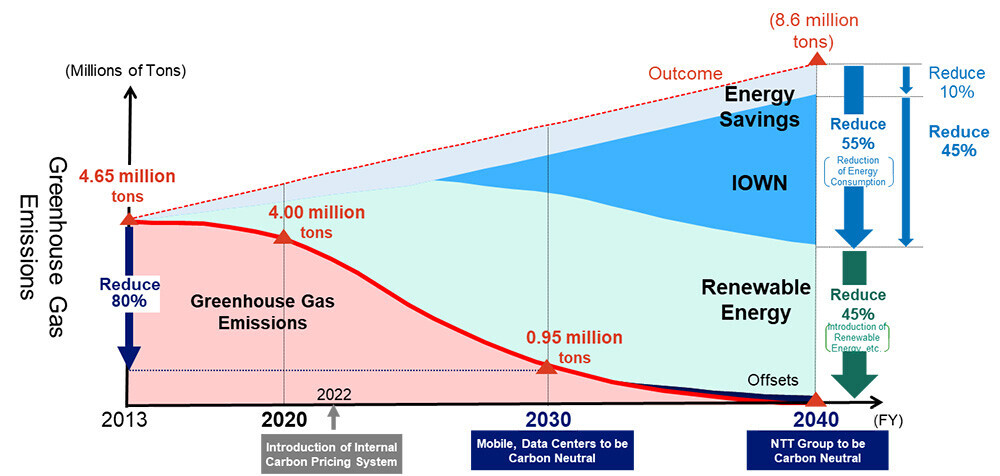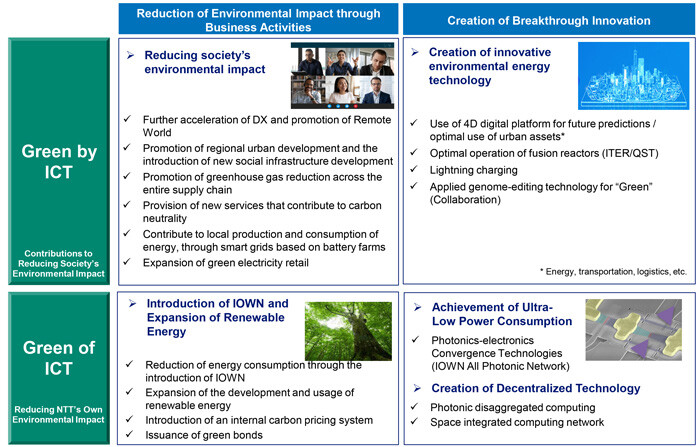Microsoft ends support for Internet Explorer on June 16, 2022.
We recommend using one of the browsers listed below.
- Microsoft Edge(Latest version)
- Mozilla Firefox(Latest version)
- Google Chrome(Latest version)
- Apple Safari(Latest version)
Please contact your browser provider for download and installation instructions.
Environment and Energy Vision
We have formulated the Environment and Energy Vision in May 2020 and have declared to increase the proportion of renewable energy use by the NTT Group as a whole by 30% or more by FY 2031.
In September 2021, we have also formulated a new environment and energy vision "NTT Green Innovation toward 2040" to simultaneously achieve zero environmental impact and economic growth by "Reduction of Environmental Impact through Business Activities" and "Creation of Breakthrough Innovation". Based on this vision, our group aims to be carbon-neutral by FY 2040.
In November 2021, the NTT Group restructured its existing CSR Charter, which lays out the basic policy for CSR activities including environmental activities, and established the NTT Group Global Sustainability Charter. Based on this charter, the NTT Group will promote various initiatives to support our commitment towards a sustainable society. The IOWN concept will support these initiatives enabled by high ethical standards and cutting-edge technologies and innovation. The NTT Group will promote corporate and economic growth and, at the same time, will contribute to resolving social issues to realize a sustainable society.

Basic Policy and Action Guidelines
Basic Policy
The NTT Group is committed to achieving a new level of prosperity where humanity can coexist and preserve nature for generations to come. To this end, we will work to balance solving ecological problems and improving economic development by reducing the environmental impact of our business activities and creating new technologies and innovations.
Action Guidelines
- Reducing greenhouse gas emissions
The NTT Group is committed to initiatives that reduce greenhouse gas emissions throughout its business activities and society as a whole, by rolling out IOWN technology, increasing development and use of renewable energy sources, and providing services that contribute to carbon neutrality. - A commitment to resource recycling
We will shift from a one-time use consumption-oriented company to a recycling-oriented one. We will promote the effective use of resources throughout the entire life cycle of products and systems, from procurement to use and disposal. - Conserving ecosystems
Through our business and employee activities, we will promote initiatives related to conserving ecosystems within nature. - Compliance with laws and regulations and fulfillment of social responsibilities
We comply with the laws and regulations related to environmental issues in each country and region, and act with high ethical standards. - Establishing and maintaining environmental management systems
We will establish the Green Innovation Committee chaired by the Representative Director and Senior Executive Vice President, and discuss basic strategies concerning environmental issues, the status of implementation of activities, and information disclosure, and implement relevant initiatives. - Stakeholder engagement
We will engage with stakeholders throughout our entire value chain to help resolve environmental issues.
Goals under the "NTT Green Innovation toward 2040"
The NTT Group has set the following goals for FY 2030 and FY 2040.
| Fiscal year | Main targets |
|---|---|
| 2030 | 80% reduction of greenhouse gas emissions from FY 2013 for NTT Group Carbon neutrality for mobile (NTT DOCOMO) and data centers sectors |
| 2040 | Carbon neutrality for NTT Group |
(Targets of the above reduction objectives)
GHG protocol: Scope 1 (our own direct greenhouse gas emissions) and Scope 2 (indirect emissions associated with the purchase of electricity, heat and steam that are provided by other companies)
Mobile :15 companies in the NTT DOCOMO Group (as of September 28, 2021)
Main activities for achieving carbon neutrality by 2040
NTT Group will achieve carbon neutrality through a combination of
(1) Increased use of renewable energy: Reduce greenhouse gas emissions by 45 %
(2) Lower energy consumption with IOWN technologies: Reduce greenhouse gas emission by 45 %
 Illustration of NTT Group greenhouse gas emission reductions (domestic and overseas)
Illustration of NTT Group greenhouse gas emission reductions (domestic and overseas)
In addition, the NTT Group will contribute to achieving carbon neutrality to society by expanding adoption of IOWN technologies from the telecommunications filed to other industries, providing new services, and strengthening development and expanding introduction of renewable energy. This will to the realization of the Japanese government's declaration of "Carbon Neutrality by 2050".
(Reference) NTT's main initiatives


Participation in international initiatives
Participation in SBT*1
NTT Corporation has set greenhouse gas emission reduction targets for 2030 as NTT Group and was approved by the SBT (Science Based Targets) initiative.
NTT group will steadily promote initiatives based on SBT, such as the use of renewable energy, so that we achieve zero environmental impact and contribute to the reduction of the environmental impact of our customers, companies, and society.

NTT Group's greenhouse gas emissions reduction targets
Scope 1 and 2*2 : 80% reduction by FY2030/31 from FY2018/19 base year (1.5°C level)
Scope 3*3 : 15% reduction by FY2030/31 from FY2018/19 base year
*1.Science Based Targets : Scientifically based greenhouse gas emission reduction targets for corporates in accordance with the Paris Agreement. The SBT initiative, a climate change initiative led by the United Nations Global Compact (UNGC), the CDP (formerly the Carbon Disclosure Project), the World Resources Institute (WRI), and the World Wide Fund for Nature (WWF), designates the targets.
*2.Scope 1 : Direct emissions of greenhouse gases by businesses, such as fuel combustion
Scope 2 : Indirect emissions from the use of electricity, heat and steam supplied by other companies
*3.Scope 3 : Indirect emissions other than Scope 1 and Scope 2 (Emissions in the supply chain related to business activities)
Participation in EP100*4 and EV100*5
NTT Group has participated in the EP100 and EV100 international initiatives for energy efficiency sponsored by The Climate Group. By participating in international initiatives like these, we will be declaring NTT Group's environmental initiatives to the outside world and expressing our stance toward addressing international environmental issues.
EP100 : We will double energy efficiency between fiscal 2018 and fiscal 2026 in our telecommunications business.
EV100 : We will have 50% of our vehicles be electric vehicles by 2025, and 100% by 2030.
*4.EP100 : An international initiative by which participating companies aim to double the energy efficiency of their businesses (through 50% improvement in energy consumption efficiency, etc.).
*5.EV100 : An international initiative to promote companies' use of electric vehicles and to improve the environment for electric vehicles.
Supporting the TCFD*6
We declared our support for the TCFD in May 2020 as part of our effort to promote ESG management, one of the pillars of our medium-term management strategy. We will be disclosing information related to climate change according to the TCFD recommendations.
*6Task Force on Climate-related Financial Disclosures established by the Financial Stability Board in response to a request from the G20 countries as a framework for corporate information disclosure on climate change initiatives.
Environmental management
NTT Group Environmental Activities
NTT STORY
WEB media that thinks about the future with NTT










